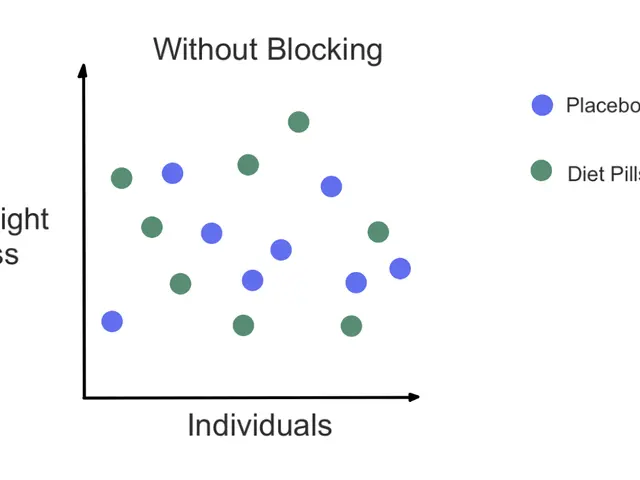Enlarged Abdomen: Origins, Remedies, and Prognosis
Stomach swelling, or bloating, can be a common and uncomfortable experience for many people. While it is often caused by eating too much or consuming gas-producing foods, there are several other possible reasons for stomach swelling.
Cirrhosis and Stomach Swelling
Cirrhosis is a condition in which functioning liver cells are replaced with nonfunctioning scar tissue. This can cause increased blood pressure in the blood vessels surrounding the liver, leading to fluid accumulation in the abdomen, and potentially resulting in stomach swelling.
Autoimmune Atrophic Gastritis (AAG) and Stomach Swelling
AAG is an autoimmune disease in which the immune system destroys parietal cells in the stomach. This can lead to iron deficiency and vitamin B12 deficiency, and symptoms may include a feeling of fullness in the upper abdomen after eating, stomach pain, nausea, and vomiting. People with AAG may require intravenous iron infusions for iron deficiency and vitamin B12 injections for vitamin B12 deficiency.
Irritable Bowel Syndrome (IBS) and Stomach Swelling
IBS is a chronic gastrointestinal disorder that causes bloating, stomach pain or discomfort, constipation, or diarrhea. The cause of IBS is unknown, but people with IBS tend to have higher levels of sensitivity in the intestines. IBS commonly causes stomach bloating along with other gastrointestinal symptoms.
Common causes of IBS leading to bloating include dietary triggers, stress, hormonal changes, and gut muscle spasms. Common symptoms of IBS (including those that cause bloating) include abdominal pain and cramping, bloating and gas, changes in bowel habits, and other symptoms such as nausea, fatigue, and sometimes urgency or incomplete evacuation sensations.
Home treatments for IBS and bloating include dietary modifications, lifestyle changes, medications, and supplements. Dietary modifications involve following a low-FODMAP diet, avoiding known triggers such as dairy, gluten, and carbonated drinks, and maintaining adequate hydration and balance fiber intake. Lifestyle changes include regular physical activity and stress management techniques such as relaxation exercises, mindfulness, or cognitive behavioral therapy. Medications and supplements may include over-the-counter antispasmodics, probiotics, prokinetics, rifaximin (Xifaxan), and gas-producing foods elimination from the diet.
Congestive Heart Failure (CHF) and Stomach Swelling
CHF is a disease that impairs the heart's ability to pump blood, causing blood to build up in the chest and potentially seep down into the abdomen, causing stomach swelling. Other symptoms of CHF include persistent coughing or wheezing, shortness of breath, increased heart rate, tiredness, fatigue, nausea, lack of appetite, confusion, and impaired thinking.
If a person believes their stomach swelling is related to their diet, they may wish to try the low FODMAP diet. If a person is experiencing persistent or worsening symptoms, such as severe pain, significant weight loss, or blood in stool, they should seek medical advice from a healthcare professional.
Additional Causes of Stomach Swelling
Other possible reasons for stomach swelling include high salt intake, hypersensitivity to the digestive process, imbalance of gut microbiota, small intestinal bacterial overgrowth (SIBO), gallstones, a blockage in the intestine, an increased curvature at the bottom of the spine, edema due to some types of cancer, and hypersensitivity to the digestive process. Treatment approaches for these conditions depend on their underlying cause and may include avoiding alcohol, quitting smoking, losing weight, regular exercise, good hygiene, necessary vaccinations, cutting salt out of the diet, and taking diuretics.
In summary, stomach swelling can have various causes, ranging from dietary issues to more serious underlying conditions. It is important to seek medical advice if experiencing persistent or worsening symptoms. Home treatments, such as dietary modifications and lifestyle changes, can help manage symptoms in some cases.
- Maintaining a balanced diet rich in healthy food and food benefits, particularly avoiding dairy for individuals with lactose intolerance, can aid in weight loss and prevent stomach swelling caused by digestive discomfort.
- In the realm of weight-management, fitness-and-exercise, and skin-care, regular activity boosts metabolism and reduces bloating, contributing to overall health-and-wellness.
- Nutrition plays a pivotal role in managing medical-conditions like Cirrhosis, which can cause fluid accumulation in the abdomen, potentially leading to stomach swelling. Specifically, a nutritious diet can help support liver function in the face of scar tissue buildup.
- Science continues to unravel nutritional complexities, with the field of nutrition offering insight into both common reasons for stomach swelling (e.g., consuming gas-producing foods) and less known causes, like autoimmune diseases such as Autoimmune Atrophic Gastritis (AAG).
- Proper weight-management and dietary modifications involving low-FODMAP regimens can help individuals struggling with Irritable Bowel Syndrome (IBS) manage symptoms and reduce stomach bloating.
- Dealing with underlying health issues like Congestive Heart Failure (CHF), which can cause fluid buildup and stomach swelling, often necessitates the oversight of medical professionals, and may involve adjustments to diet, exercise, and potentially medication.






